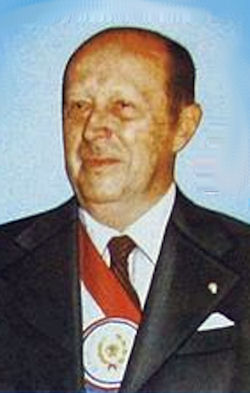Alfredo Stroessner Mattiauda - End Game
 When Alfredo Stroessner Mattiauda first took office in August 1954, Juan Domingo Peron was president of Argentina, Getulio Dornelles Vargas was president of Brazil, and Dwight D. Eisenhower was president of the United States.
When Alfredo Stroessner Mattiauda first took office in August 1954, Juan Domingo Peron was president of Argentina, Getulio Dornelles Vargas was president of Brazil, and Dwight D. Eisenhower was president of the United States.
As Stroessner and the enduring small group of supporters around him aged, the regime was increasingly unable to respond to popular demands to begin a transition toward democracy, despite much speculation in the mid-1980s that change was in the air. The demands for change originated from a variety of sources, both foreign and domestic.
The regime began to decline in the 1980s. The end of the construction bonanza brought economic troubles which Paraguay had long evaded, so Stroessner could no longer reward all of his allies at once. When the economic crisis of the 1980s arose, the business class became aware that a backward, bureaucratized state prevented further liberalization of the economy.
As the neighboring republics of Argentina, Bolivia, Brazil, and Uruguay underwent political transitions from authoritarian to democratic regimes in the early 1980s, Paraguay was often considered with Chile, on the far side of the Andes, the only remaining analogous regime in South America. Pressure from these new democracies for a similar transition in Paraguay was low.
In the 1980s the United States was clearly in favor of a political opening for a peaceful transition in the post- Stroessner era. Support for democracy with broad participation, as well as a pointed critique of the Stroessner regime's human rights policies, also were prominent in the speeches of Pope John Paul II during his visit to Paraguay in May 1988.
In addition to the external isolation and foreign pressure, there were important internal pressures for a transition. After very high rates of economic growth in the 1970s, Paraguay's economy stagnated in the 1980s. In addition, the external debt nearly doubled during the same period. Within Paraguay the major opposition political parties, which had formed a National Accord (Acuerdo Nacional) in 1979, began to promote public demonstrations in April 1986. This growing, heterogeneous movement was joined in its opposition by other organizations and movements, including the Roman Catholic Church and sectors of business, labor, and university students.
On February 3, 1989, Stroessner was overthrown in a military coup headed by Gen. Andres Rodriguez and a group of colonels and younger generals. A succession crisis brought down the aging Stroessner. Rodríguez and the junior officers were dissatisfied with the increasing de-professionalization of the military and opposed to attempts by the party’s Militant wing to promote Air Force Colonel Gustavo Stroessner to succeed his father. Among specific complaints from the professional soldiers were that salaries were too low to live on (the higher officers survived because they had access to the spoils of corruption), and that the top-heavy officer corps left few chances for promotions. Carlos Martini and Carlos Lezcano described the succession problem as one of “internal distributive illegitimacy,” in the sense that Stroessner had not developed mechanisms to negotiate the distribution of political and economic power within the regime. The result was internal dissension, which Stroessner was no longer able to control. An attempt to squelch the competition by stacking the party and military hierarchies with loyalists merely heightened the dissatisfactions of the excluded Rodríguez and his supporters. Rodríguez may have seen the coup as a continuation of Stronist legitimacy, in the sense that he had been Stroessner’s hand-picked successor in 1986.
Reforms were the word of the day since long-time strongman Alfredo Stroessner left the country after a coup on February 2-3. Prospects for real and enduring change must, nonetheless, be tested over time. The new government led by Provisional President Rodriguez began announcing its plans for a transition with a number of positive-sounding promises concerning elections, democratic institutionalization, human rights, and drugs. Rodriguez, as the Colorado Party candidate, easily won the presidency in elections held that May 1989 and the Colorado Party dominated the Congress. In 1991 municipal elections, however, opposition candidates won several major urban centers, including Asuncion. As president, Rodriguez instituted political, legal, and economic reforms and initiated a rapprochement with the international community.
- THE TRANSITION TO DEMOCRACY IN PARAGUAY: PROBLEMS AND PROSPECTS Rapporteur's Report Nancy R. Powers Working Paper #171 - January 1992
|
NEWSLETTER
|
| Join the GlobalSecurity.org mailing list |
|
|
|

